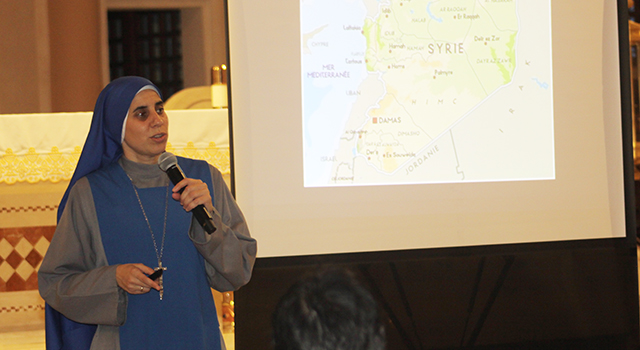By Rocio Granados - La Voz Catolica
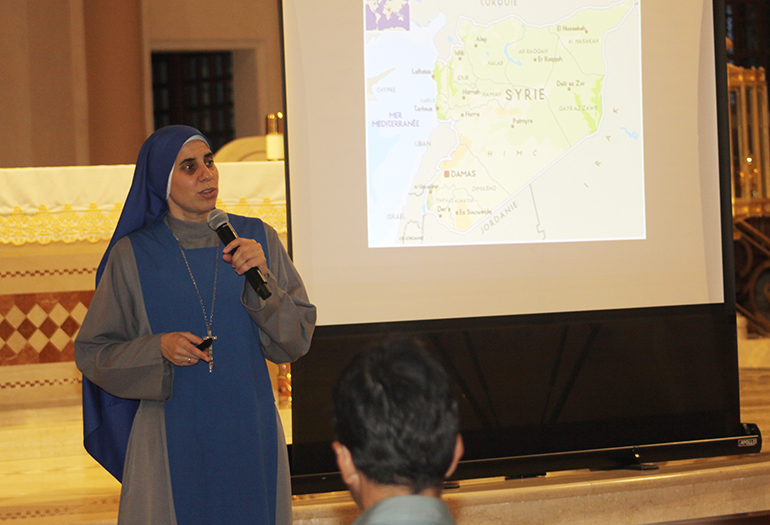
Photographer: ROCIO GRANADOS | LVC
Sister Maria de Guadalupe Rodrigo, an Argentine missionary who has lived in Aleppo, Syria, since 2011, shares her experiences of war and persecution of Christians there during a visit to St. Patrick Church, Miami Beach.
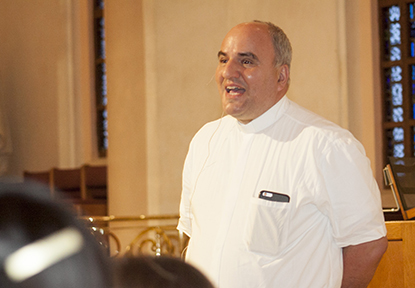
Photographer: ROCIO GRANADOS | LVC
Father Roberto Cid, pastor of St. Patrick, Miami Beach, translates Sister Maria de Guadalupe Rodrigo's presentation from Spanish to English. The Argentine missionary, a member of the Congregation of the Incarnate Word, spoke at the parish April 20.
MIAMI BEACH | Christians in Syria are suffering from war and persecution, and feel abandoned by Christians in the West, said Sister Maria de Guadalupe Rodrigo, an Argentinian missionary living in Aleppo, Syria, since 2011.
Sister Guadalupe visited Miami in April and spoke at several churches, including St. Patrick in Miami Beach, St. Brendan in Westchester, Corpus Christi in Miami, and St. Agnes in Key Biscayne. On April 29, she participated in the WeAreN2016 International Congress on Religious Freedom at the United Nations in New York.
A member of the Congregation of the Incarnate Word, Sister Guadalupe sees the war that has lasted for more than five years in Syria as being planned and driven by economic interests.
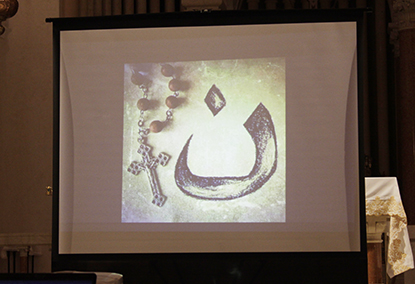
Photographer: ROCIO GRANADOS | LVC
This is the symbol for the letter "Nun" in Arabic, the first letter in the word "Nazarene." It has become a symbol for the persecuted Christians in the Middle East.
"In Syria, conviviality between Christians and Muslims was good, and although Christians are a minority in the Middle East, they had everything there," she said.
Aleppo is the second largest city in Syria, where the congregation keeps a home for young female college students. People there were doing well, "they had a good standard of living," Sister Guadalupe said.
When the Arab Spring began in Tunisia, Libya and Egypt, people in Syria did not think it would reach their country. However, unrest began in the south, and it multiplied when people in the capital, Damascus, and Aleppo took to the streets to support their president, Bashar al-Assad. He has ruled Syria since 2000, when he succeeded his father, Hafez al-Assad.
"They preferred to remain as they were rather than falling into Islamic fundamentalism. The result of this war would not be democracy. They already saw it coming," said Sister Guadalupe.
She blamed the international media for misrepresenting reality when reporting that the Syrian people were joining the Arab Spring and pouring into the streets to demand democracy.
"The news we were getting was that the ones who had come were not Syrians; and that they had already butchered several Christians, pinning signs on them that said, 'Do not touch, Christian,'" she said.
Media lies"One of the great sorrows of the people is the lie that has been told about this, and the abandonment of the West," she added.
Extremist groups arrived in Aleppo from one day to the next. They besieged the city of five million people, blockading it for over a year, until the national army could regain control of the access routes. And the world did not know.
They ran out of fuel, gas, "and those people, who once had everything, would go out and cut branches from the trees to cook something to eat," Sister Guadalupe recalled. "We survived as we could, without fruits, vegetables or meat; only with rice, noodles and canned goods. People said, 'They are letting us die of hunger and thirst.'"
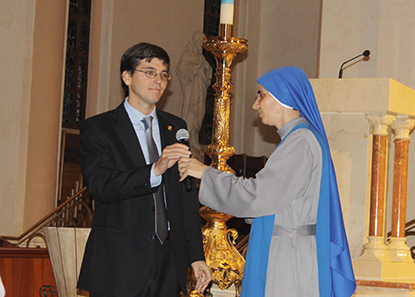
Photographer: ROCIO GRANADOS | LVC
Sister Maria Guadalupe Rodrigo hands the microphone to Francisco Ruiz Guiñazú, of the Argentinian law offices Estudio Garrido, who are carrying out a campaign to help the persecuted Christians in the Middle East.
In addition to food shortages, electricity is limited to only one or two hours a day. Water is supplied by the hour, once a week or every 10 days, and all this on top of constant fighting.
"It's terrorism, a dirty war in the middle of the city. Civilians are attacked constantly, there are no safe neighborhoods. They also attack hospitals, but their first targets are Christian neighborhoods and churches," said Sister Guadalupe.
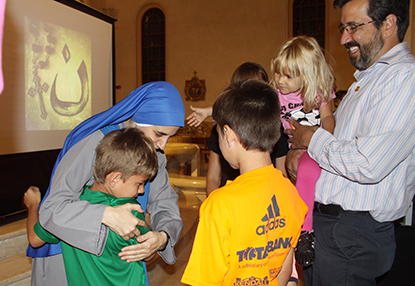
Photographer: ROCIO GRANADOS | LVC
Sister Maria de Guadalupe Rodrigo hugs Rico Borjon as his siblings Leonardo and Victoria, and their father, Ricardo, look on.
As a result of the war and persecution, more than 50 percent of the Syrian population has been displaced. According to the UN, of the 21 million inhabitants, more than seven million have been displaced internally and more than four million have sought refuge in other countries.
Refugees ‘a distraction’
Sister Guadalupe maintains that the refugee issue is diverting attention from the main problem, which is the war. She said the issue is being manipulated and used since the picture was published of the dead child washing up on the Turkish coast. The photo sparked talk of refugees and the massive influx of Muslims to Europe, who have nothing to do with Syria.
"We are being distracted with something else that is not the most important issue. The refugees are one of the consequences of this war," she said.
Sister Guadalupe also said that Christian refugees are suffering persecution in European countries. She told of a Christian family from Aleppo who managed to get to Germany, where they are suffering mistreatment at the hands of Muslim refugees who force the family to pray with them and women to cover their heads.
"We cannot believe everything we see on television. We need to be informed," she said.
She also noted that backing the fundamentalists are those who are financing the war. She criticized rich Islamic countries that do not open their borders to their fellow Muslim refugees but demand that Europe welcome them.
For the people who remain in Aleppo, destruction and shelling are daily events. "At first we locked ourselves in; explosions and gunfire were constant. Then people started to go out, the children went to school, young people to college. No one goes out merely to take a walk," she said.
Children collect bullets because they find them everywhere. People dodge snipers. Projectiles usually destroy only one room; the problem is the blast wave that spreads shrapnel of nails, cans and glass for hundreds of meters.
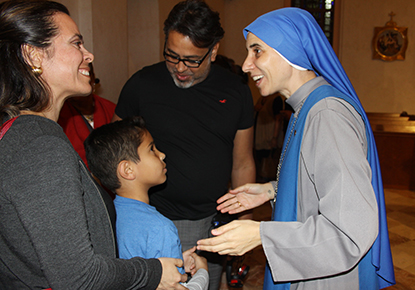
Photographer: ROCIO GRANADOS | LVC
Andrea Garay, her husband, Rafa Herrera, and their son, Gabriel Herrera, members of St. Stephen Parish in Miramar, greet Sister Maria de Guadalupe Rodrigo after her talk at St. Patrick, Miami Beach.
Healthcare has collapsed and explosions happen every 15 or 30 minutes. For a long time now there have been no ambulances. Trucks carry the wounded to hospitals, and other trucks carry bodies and remains of human bodies in black bags. The streets are cleaned to control the stench. Life goes on a half hour later, and those who want to find someone must go to the morgue to search bag by bag, something that the sisters and priests have done many times.
Sister Guadalupe, who also lived in the Holy Land and Egypt for 12 years, left Syria to go home to Argentina for family reasons. She said her superiors have given her the option of not returning, but she wants to go back.
She said she does not want to abandon the people, although she has had several near-death experiences, such as when a missile fell 50 meters from the archdiocesan offices where they live. Sister Guadalupe said they survived because only a few minutes before they had left the bell tower where they were rehearsing the choir because it was too cold. The missile killed more than 400 people.
‘Clung to faith’"People experiencing war appreciate the important things," said Sister Guadalupe, showing a photograph of the people of her parish in Aleppo, smiling. "Those are genuine smiles," she added.
"They have clung to faith. The constant contact with death has made them hang on to life. It makes them realize that life is short, and live happily every day, as if it were their last, because that is how it is. Every time they leave, they say goodbye to their loved ones, and many say they have never prayed so much as now. This is how persecuted Christians live," Sister Guadalupe said. "They now take care of their souls, now the churches are filled. They perform their daily activities motivated by faith."
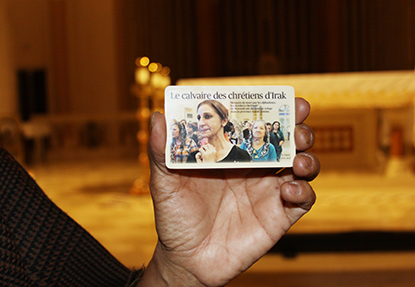
Photographer: ROCIO GRANADOS | LVC
Card explaining the situation of Christians in the Middle East, prepared by Estudio Garrido, an Argentinian law firm.
She said Christians who suffer persecution and war need our prayers in order to stand firm in their faith. She also called on Christians here to spread the news about what is really taking place. "All this is happening because the world ignores this reality. It is our responsibility to make it known for it to end."
Finally, she asked people to help any way they can.
"The lesson she is giving us is that faith has no limits; that whoever truly lives their faith, even in the midst of dying, can smile like Christ smiles just as he is being crucified," said Abril Borjon, a parishioner of St. Patrick who attended Sister Guadalupe’s talk there April 20.
Borjon came with her husband and four children to the presentation. She said it was "an eye-opener, because you never imagine the reality that people live there."
For Andrea Garay, a parishioner of St. Stephen in Miramar, the presentation touched "an issue that very few people know; it is not just about knowing their reality, but our own reality, as well. We are living as totally frivolous Christians. It is a testimony that really changes your way of living."
FIND OUT MORE
To learn more about the missionaries of the Incarnate Word in Syria, visit their pages on Facebook: SOS Christians in Syria, www.facebook.com/SOSchristinasinsyria, and Friends of Iraq, www.facebook.com/friendsofiraq.
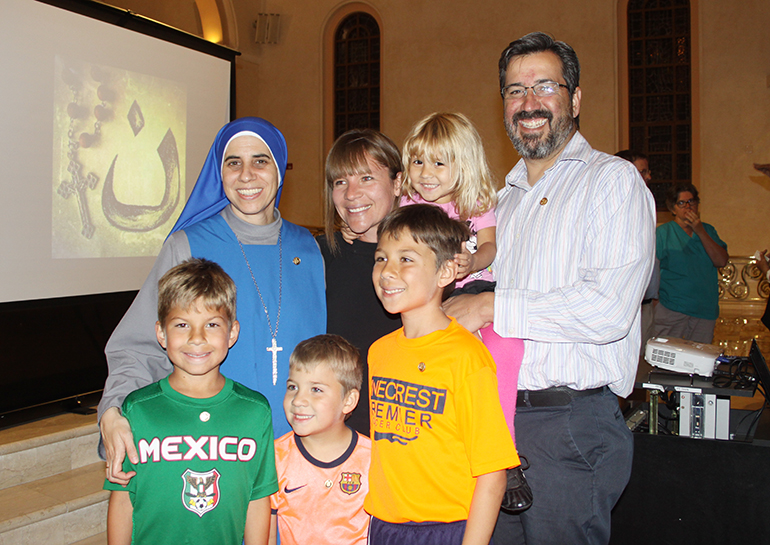
Photographer: ROCIO GRANADOS | LVC
The Borjon family, parishioners at St. Patrick, pose for a photo with Sister Maria de Guadalupe Rodrigo, of the Congregation of the Incarnate Word, after her talk at the church April 20. From left, top: Sister Guadalupe and Abril, Victoria and Ricardo Borjon; below, from left, Rico, Patricio and Leonardo Borjon.
